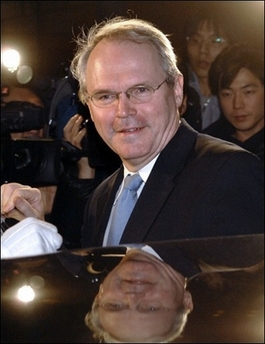Asia-Pacific
Hill wants 'good beginning' at nuke talks
(AFP)
Updated: 2007-02-05 09:31
 |
Large Medium Small |
EOUL - Chief US nuclear envoy Christopher Hill has called for a "good beginning" at upcoming six-party talks on dismantling North Korea's atomic weapons programme.
 Chief US nuclear envoy Christopher Hill, pictured, has called for a "good beginning" at upcoming six-party talks on dismantling North Korea's atomic weapons programme. [AFP]  |
"What we would like to see is to have a good beginning," he said ahead of a meeting with his South Korean counterpart Chun Yung-Woo. "But the ultimate task for us is to complete the denuclearization, not just to begin the denuclearization."
Hill earlier spoke to Foreign Minister Song Min-Soon and other officials. "South Korea and the US have reached a perfect consensus on the strategy for the next round of six-party talks," Chun said after meeting the US envoy Sunday.
Speaking on his arrival Saturday, Hill expressed hoped of progress in the new round of talks, which gather the two Koreas, China, Russia, Japan and the United States.
The round aims to begin the implementation of a September 2005 deal under which the North agreed to scrap its nuclear weapons in exchange for energy and economic aid, security guarantees and diplomatic benefits.
That deal went nowhere after North Korea boycotted the six-party forum two months later in protest at the imposition of US financial sanctions on a Macau bank accused of handling counterfeit money for Pyongyang.
Pyongyang then upped the stakes by testing a nuclear device for the first time last October, and six-nation talks in December - the first for more than a year - produced little of substance.
But hopes of progress this time around have been revived after rare direct US-North Korean negotiations in Berlin last month.
"We had hoped to do that in December and I think we do have some reason to believe we can make some progress on that," Hill said Saturday, referring to implementing the 2005 deal.
Hill urged DPRK to make "some real changes on the ground" toward disarmament.
He refused to give details, but experts cite a freeze of activities at Pyongyang's plutonium-producing main nuclear reactor at Yongbyon in return for economic benefits.
Japan's Asahi Shimbun newspaper, meanwhile, reported Sunday that Pyongyang has demanded more than 500,000 tonnes of oil a year or an equivalent volume of energy assistance in return for suspending the reactor.
The demand emerged when North Korean officials, including its chief nuclear envoy Kim Kye-Gwan, met two US experts in Pyongyang last week, the paper said.
"They also want a commitment by the United States to lift economic restrictions on North Korea, and the discussion focused on the American list of state sponsors of international terrorism," former US State Department official Joel Witt told Japan's public broadcaster NHK after his Pyongyang trip.
Hill denied having had any discussions about heavy fuel oil with North Koreans, but stressed the 2005 statement does refer to economic assistance and energy assistance.
US and North Korean officials held a separate meeting in Beijing last week aimed at settling the dispute over the US financial sanctions, which have until now blocked progress on the nuclear issue.
Hill called the meeting "very useful" despite its lack of agreement.
The US sanctions were imposed because Washington accused Macau-based Banco Delta Asia (BDA) of serving as a key conduit for North Korean money laundering and dollar counterfeiting.
North Korea denied the US claims and has insisted that the banking curbs - which have frozen some 24 million dollars in its accounts at BDA - be removed before any nuclear discussions.
Hill leaves Monday for Tokyo and talks with Japanese officials before heading to Beijing.
| 分享按钮 |